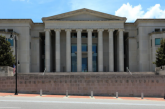By Brianna Gonzalez Ulloa
LOUIS, MISSOURI — On Oct. 21, 2022, the Biden administration was ordered to temporarily halt any decisions moving forward on the student debt cancellation program after six Republican-led states issued an appeal to block the loan forgiveness. The Eighth Circuit Court of Appeals’ order came a day after the U.S. District Court Judge Henry Autney in St. Louis dismissed the states’ case for lack of legal standing.
In the September lawsuit, Arkansas, Iowa, Kansas, Missouri, Nebraska, and South Carolina contended a loss of tax revenue if the student debt relief plan were to be enacted. Judge Autney noted that they “present[ed] important and significant challenges to the debt relief plan,” the states’ injury is merely alleged.
While the Biden administration previously stated that debt forgiveness would begin as early as Sunday, their plan for discharging student loans will be set back until the U.S. appeals court rules on the emergency request.
Originally a promise during his presidential campaign in 2020, Biden and his administration has formed a three-part plan that aims to provide relief to individuals whose income is less than $125,000 and who are eligible for Pell Grants. Those in low- and middle-class households will be able to receive up to $20,000 in debt forgiveness, while others will be relieved of $10,000 through the program.
Since the application became available online, 22 million Americans have applied for loan relief. It’s estimated that this will cost the U.S. government approximately $400 billion over a span of 30 years.
“Today’s temporary decision does not stop the Biden Administration’s effort to provide borrowers the opportunity to apply for debt relief,” U.S. Secretary of Education Miguel Cardona responded after questions about the implications the temporary stay may have on the application arose, “nor does it prevent us from reviewing the millions of applications we have received.”
Republican lawmakers, attorneys, and businesses alike claim Biden’s actions to be unconstitutional and an abuse of Congressional authority.
Just hours before Autney’s ruling, U.S. Supreme Court Judge Amy Coney Barrett rejected an appeal on a case filed by conservative taxpayer group the Wisconsin Institute for Law and Liberty that sought to prevent the student loan forgiveness program from moving forward. While Barrett oversees emergency appeals filed by Wisconsin and neighboring states, she did not discuss with nor involve the rest of the court on this particular case and has declined to comment on the ruling.
The case had traveled through the lower federal courts though none ruled in favor of the plaintiffs. U.S. District Judge William Griesbach dismissed the group’s case with the same reasoning as Autney, noting a lack of legal standing in bringing the case forward.
Many more have attempted to legally challenge the program, though their attempts have been fruitless.
In the court filing for the federal appeal case, the Biden administration cited the 2003 Higher Education Relief Opportunities for Students (HEROES) as legal justification for the plan. The act grants the Secretary of Education the authority to nullify the terms on student loans, among other programs and policies, in the case of a national emergency. The Biden administration claims this applies to the two-year-long COVID-19 pandemic.
Republicans argue the law is being misinterpreted by the administration and that the United States is no longer under a state of national emergency as confirmed COVID cases decline.
Democrats, meanwhile, have seemingly been split in regard to the current proceedings of the plan. With midterm elections (having been) right around the corner, those facing difficulties during their reelections or campaigns (were) keen to jump ship while others hoped to utilize the policy in gaining votes with their majority at stake in Congress.
In response to the order, Press Secretary Karine Jean-Pierre released a statement saying that the plan “merely prevents debts from being discharged until the court makes a decision.”
It is uncertain, however, whether the court will rule on the emergency request in time before the pandemic payment pause ends. According to President Biden, student loan payments are expected to restart by Jan. 1. With nearly 22 million Americans dependent on this debt forgiveness program, if the issue is not resolved soon, it is likely that some families will never be able to regain their financial footing in the aftermath.
“The Administration will continue to fight Republican officials suing to block our efforts to provide relief for working families,” Jean-Pierre affirmed.




